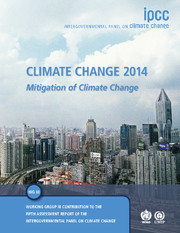 Climate Change 2014: Mitigation of Climate Change
Climate Change 2014: Mitigation of Climate Change from Chapters
Published online by Cambridge University Press: 05 February 2015
Introduction
This framing chapter has two primary purposes: to provide a frame-work for viewing and understanding the human (social) perspective on climate change, focusing on ethics and economics; and to define and discuss key concepts used in other chapters. It complements the two other framing chapters: Chapter 2 on risk and uncertainty and Chapter 4 on sustainability. The audience for this chapter (indeed for this entire volume) is decision makers at many different levels.
The significance of the social dimension and the role of ethics and economics is underscored by Article 2 of the United Nations Framework Convention on Climate Change (UNFCCC), which indicates that the ultimate objective of the Convention is to avoid dangerous anthropogenic interference with the climate system. Two main issues confronting society are: what constitutes ‘dangerous interference’ with the climate system and how to deal with that interference (see box 3.1). Providing information to answer these inter-related questions is a primary purpose of the IPCC. Although natural science helps us understand how emissions can change the climate, and, in turn, generate physical impacts on ecosystems, people, and the physical environment, determining what is dangerous involves judging the level of adverse consequences, the steps necessary to mitigate these consequences, and the risk that humanity is willing to tolerate. These are questions requiring value judgement. Although economics is essential to evaluating the consequences and trade-offs associating with climate change, how society interprets and values them is an ethical question.
Our discussion of ethics centres on two main considerations: justice and value. Justice requires that people and nations should receive what they are due, or have a right to. For some, an outcome is just if the process that generated it is just. Others view justice in terms of the actual outcomes enjoyed by different people and groups and the values they place on those outcomes.
To save this book to your Kindle, first ensure no-reply@cambridge.org is added to your Approved Personal Document E-mail List under your Personal Document Settings on the Manage Your Content and Devices page of your Amazon account. Then enter the ‘name’ part of your Kindle email address below. Find out more about saving to your Kindle.
Note you can select to save to either the @free.kindle.com or @kindle.com variations. ‘@free.kindle.com’ emails are free but can only be saved to your device when it is connected to wi-fi. ‘@kindle.com’ emails can be delivered even when you are not connected to wi-fi, but note that service fees apply.
Find out more about the Kindle Personal Document Service.
To save content items to your account, please confirm that you agree to abide by our usage policies. If this is the first time you use this feature, you will be asked to authorise Cambridge Core to connect with your account. Find out more about saving content to Dropbox.
To save content items to your account, please confirm that you agree to abide by our usage policies. If this is the first time you use this feature, you will be asked to authorise Cambridge Core to connect with your account. Find out more about saving content to Google Drive.